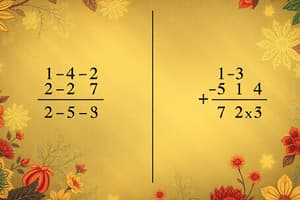Podcast
Questions and Answers
What is the first step when multiplying mixed numbers?
What is the first step when multiplying mixed numbers?
- Simplify the fraction product
- Combine the whole numbers and fractions
- Simplify the whole numbers (correct)
- Multiply the fractions
Which of the following is NOT a rule for multiplying mixed numbers?
Which of the following is NOT a rule for multiplying mixed numbers?
- Multiply the whole numbers independently
- Simplify the whole number product
- Combine the simplified whole number and fraction products
- Divide the fractions independently (correct)
What is the result of multiplying the whole numbers 2 and 3?
What is the result of multiplying the whole numbers 2 and 3?
- 7
- 6 (correct)
- 5
- 8
After multiplying fractions \(rac{1}{3} \times \frac{2}{5}\), what is the simplified fraction product?
After multiplying fractions \(rac{1}{3} \times \frac{2}{5}\), what is the simplified fraction product?
When multiplying mixed numbers, what should you do after simplifying the whole number product?
When multiplying mixed numbers, what should you do after simplifying the whole number product?
What is the main challenge associated with multiplying mixed numbers?
What is the main challenge associated with multiplying mixed numbers?
What is the result of $6 + \frac{2}{15}$ expressed as a mixed number?
What is the result of $6 + \frac{2}{15}$ expressed as a mixed number?
What product of mixed numbers is equivalent to $8\frac{1}{7}$?
What product of mixed numbers is equivalent to $8\frac{1}{7}$?
What is the result of multiplying $(4\frac{1}{4})$ by $(2\frac{2}{3})$ expressed as a mixed number?
What is the result of multiplying $(4\frac{1}{4})$ by $(2\frac{2}{3})$ expressed as a mixed number?
Which of the following products of mixed numbers is not expressible as a mixed number?
Which of the following products of mixed numbers is not expressible as a mixed number?
What is the result of multiplying $(7\frac{3}{8})$ by $(4\frac{1}{2})$ expressed as a mixed number?
What is the result of multiplying $(7\frac{3}{8})$ by $(4\frac{1}{2})$ expressed as a mixed number?
Flashcards are hidden until you start studying
Study Notes
The Multiplication of Mixed Numbers: Unraveling a Math Conundrum
Mixed numbers might seem like a straightforward combination of whole numbers and fractions, but when it comes to multiplication, they can present a unique challenge. In this article, we'll delve into the mechanics of multiplying mixed numbers, illustrating the process and revealing the underlying principles that govern their behavior.
What Are Mixed Numbers?
Mixed numbers appear as a whole number with a fraction above, such as (3\frac{1}{5}). They represent a sum of a whole number and a fraction. For instance, (3\frac{1}{5}) is equivalent to (3 + \frac{1}{5}).
The Rules of Multiplication for Mixed Numbers
To multiply mixed numbers, we apply the following rules:
- Multiply the whole numbers independently.
- Multiply the fractions independently.
- Simplify the whole number product and the fraction product separately.
- Combine the simplified whole number and fraction products by converting one of them to a mixed number if necessary.
Let's see this process in action with an example:
[(2\frac{1}{3}) \times (3\frac{2}{5})]
- Multiply the whole numbers: (2 \times 3 = 6).
- Multiply the fractions: (\frac{1}{3} \times \frac{2}{5} = \frac{2}{15}).
- Simplify the whole number product: (6) (no simplification needed).
- Simplify the fraction product: (\frac{2}{15}).
Our results so far are (6) and (\frac{2}{15}). Now we need to combine these results.
(6 + \frac{2}{15} = 6 + \frac{4}{15}) (since (\frac{2}{15} \times \frac{3}{3} = \frac{2 \times 3}{15 \times 3} = \frac{4}{15})).
Now, we can convert (\frac{4}{15}) into a mixed number: (\frac{4}{15} = \frac{2}{7}) or (2\frac{1}{7}).
(6 + 2\frac{1}{7} = 8\frac{1}{7}).
So, ((2\frac{1}{3}) \times (3\frac{2}{5}) = 8\frac{1}{7}).
Limitations and Pitfalls
One potential pitfall in multiplying mixed numbers is that not all products will be expressible as mixed numbers, as they could result in a fraction greater than one. For instance, ((3\frac{1}{2}) \times (2\frac{1}{3}) = 8\frac{5}{6}) is not a mixed number.
Conclusion
Mastering the multiplication of mixed numbers is an essential step in strengthening your grasp of algebra and arithmetic. By following the rules outlined above, you can confidently multiply mixed numbers and avoid common mistakes. As with any mathematical skill, practice will help you become more proficient and efficient in tackling these problems.
Studying That Suits You
Use AI to generate personalized quizzes and flashcards to suit your learning preferences.




